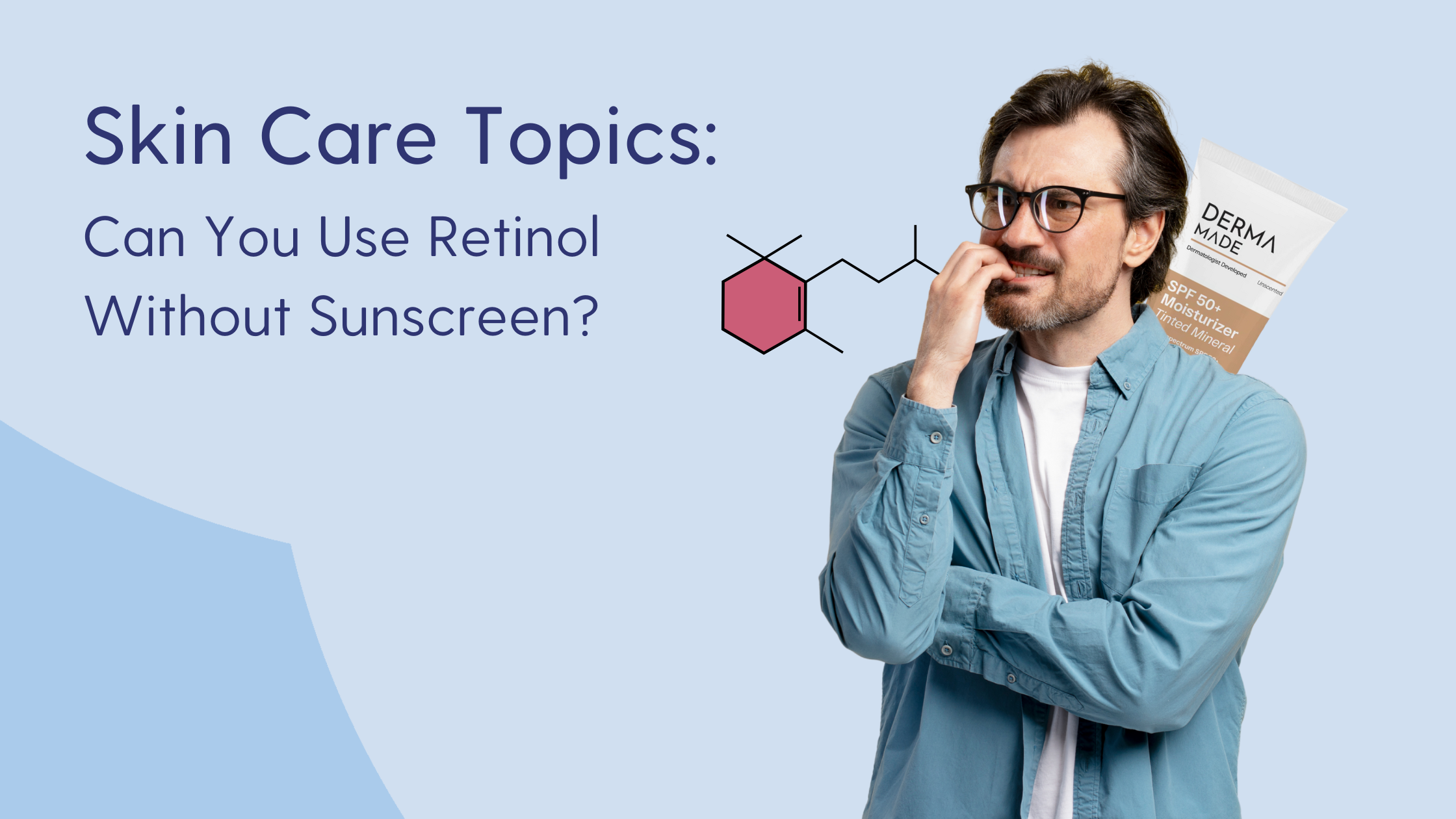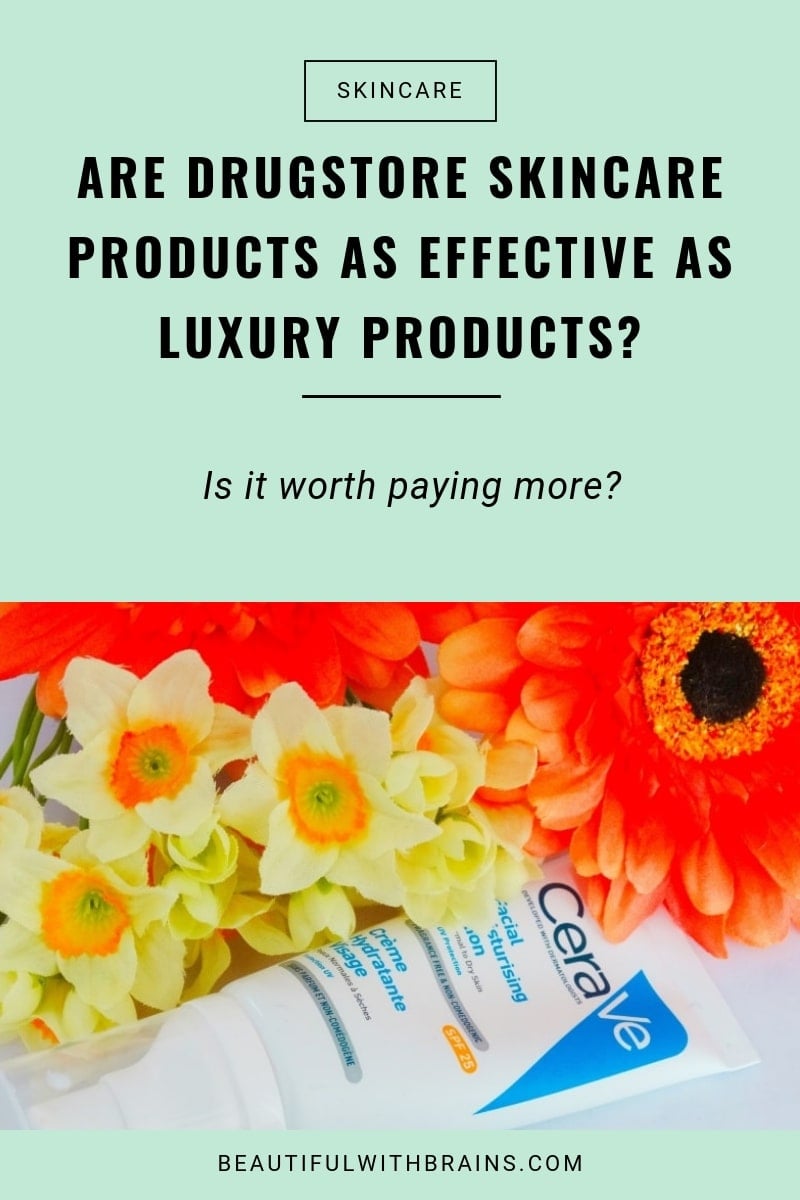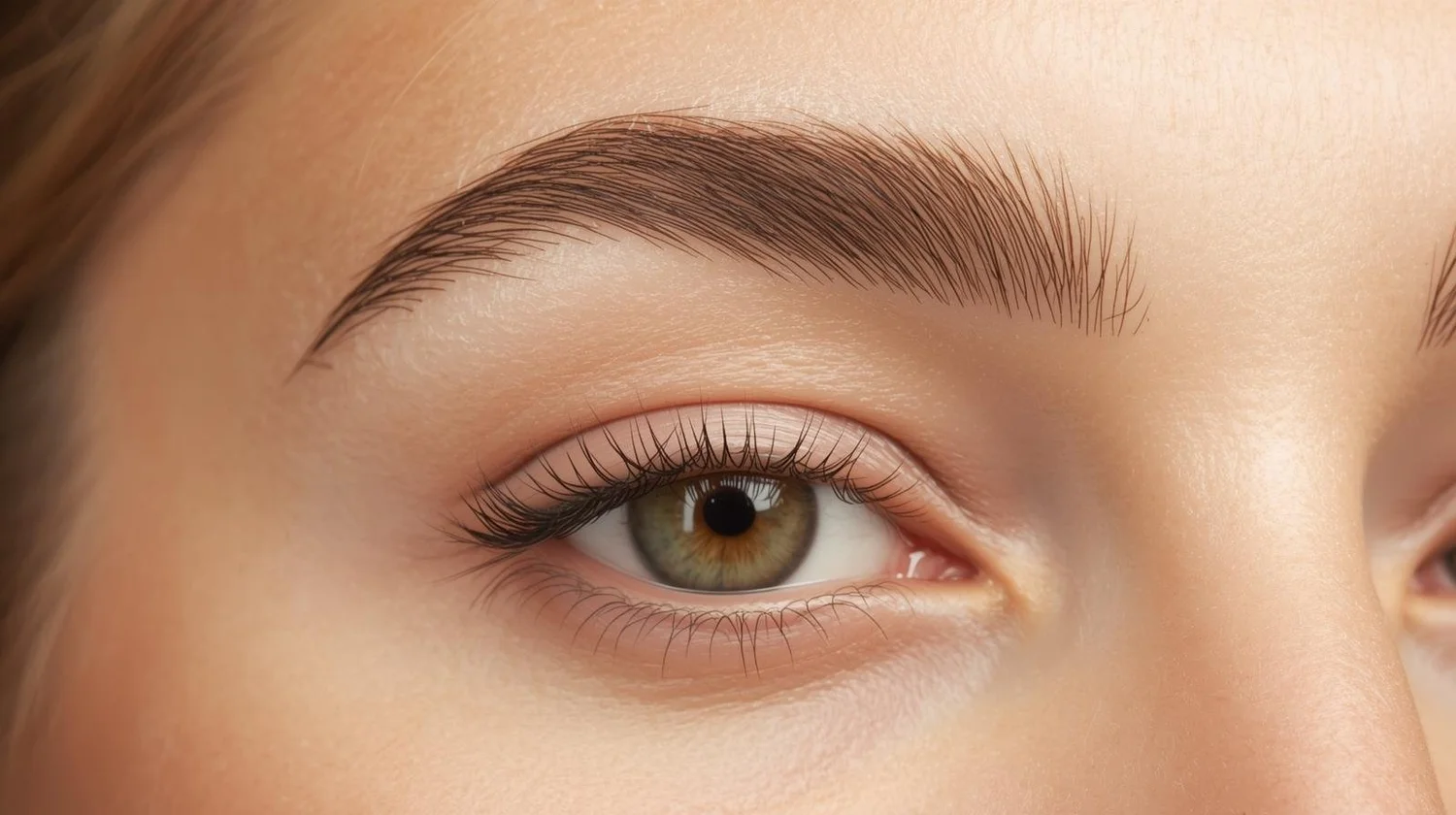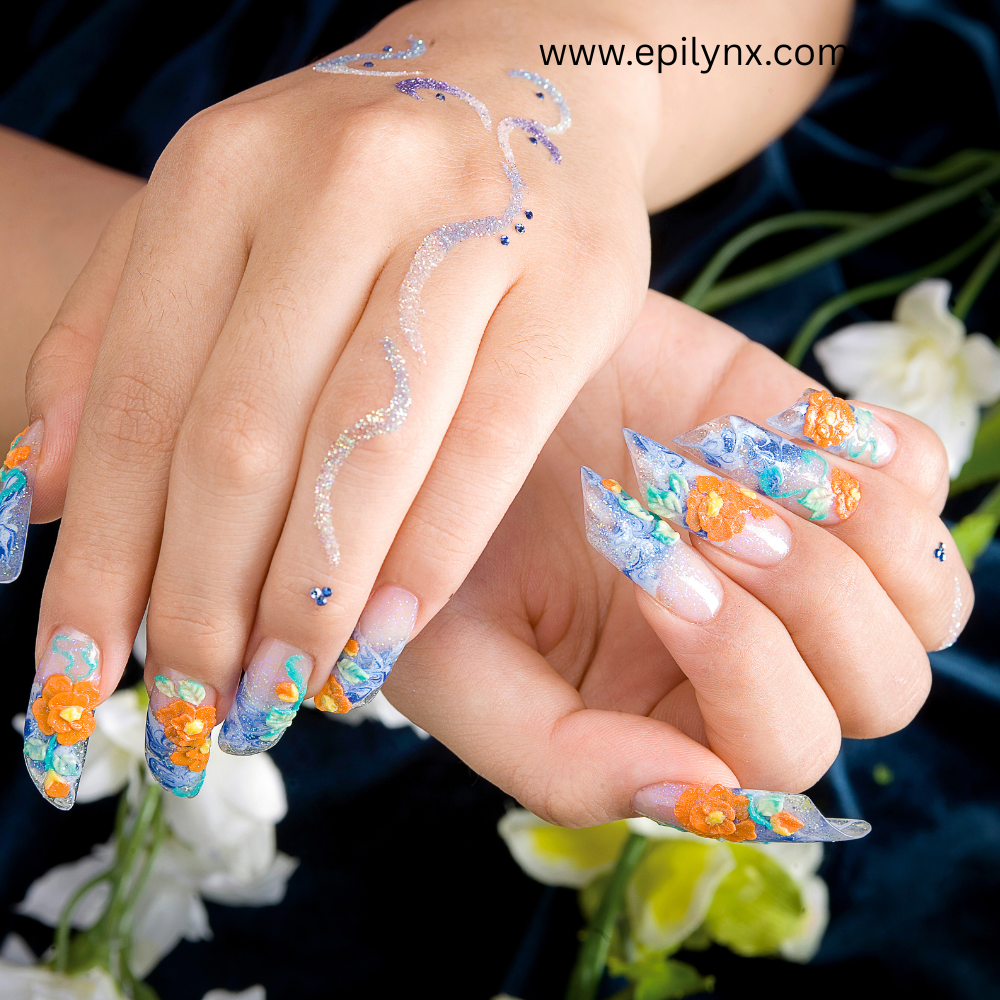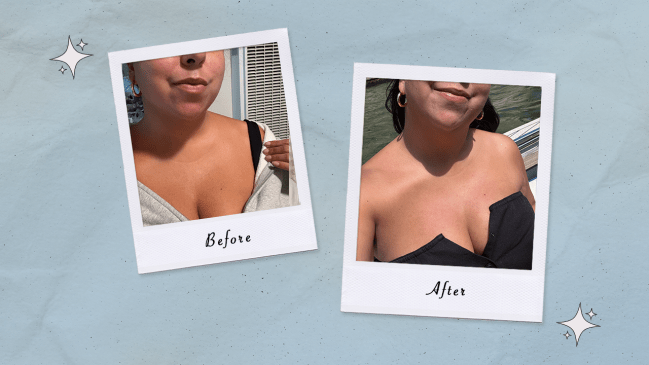🔄
Retinol is one of the best and most researched anti-aging ingredients in skin care and can be used to treat fine lines, wrinkles, hyperpigmentation, and acne. Still, there are a lot of misconceptions about how to best use retinol and its interactions with the sun’s UV light. One of the most common questions I see about this ingredient is: “Can I use retinol without sunscreen?”
The short answer is, no, you should not use retinol without sunscreen.
The longer answer in this article explains why it is so important to pair retinoids with sunscreen and tips for layering, the best time of day to apply retinol, and how to maximize its effectiveness.
Do not use retinol without sunscreen.
UV rays inactivate retinol, making it less effective.
UV rays also cause more skin damage, counteracting the beneficial effects of retinol.

How UV Light Affects Retinol
Retinol, a derivative of vitamin A, has been shown to degrade, or break down, when exposed to UV light, which lowers its effectiveness (3). This is the main reason why protecting your skin from the sun while using a retinoid is so important.
Additionally, oral retinoids and exfoliants like glycolic acid and retinoic acid can make the skin more sun sensitive. This is especially common when you’re first starting out. This increase in sun sensitivity is mostly due to the exfoliative properties of retinoids, which speed up cell turnover and thin the outermost layer of dead skin cells. Once your skin starts to get used to retinol, this side effect tends to diminish.
Thus, retinoids do not make your skin as sun-sensitive as many people have been led to believe, and the protective and anti-aging benefits of retinoids outweigh this slight increased risk for sun sensitivity. Additionally, sun exposure accelerates skin aging, so by using retinol without sunscreen, you are essentially counteracting its benefits (4).

When to Apply Retinol
Because sun exposure can break down retinol and to minimize the slight risk of increased sun-sensitivity, it is best to apply retinol and other retinoid products at night.
Retinol esters like retinyl palmitate and linoleate break down the most in the sun, so it is especially important to apply these ingredients in the evening and wash them off in the morning and follow with sunscreen during the day.
Retinol Layering Tips
If you are experiencing sensitivity or irritation from retinol when you are first starting to use it, you can layer it on top of your moisturizer. This will decrease absorption but can minimize side effects while your skin adjusts to it. If you are using retinol at night, you may want to apply lip balm to keep the retinol from rubbing onto your lips at night and causing flaking or peeling.
As your skin adjusts to retinol, you can gradually begin applying it before your moisturizer to increase absorption and effectiveness.
Although I highly recommend using retinol at night, if you have to use it during the day, layer it underneath your sunscreen and be sure to reapply sunscreen at least every two hours if you are outside.

Why Use a Retinoid?
The reasons why you would use a retinoid – to improve signs of aging, dark spots, and acne – can all be made worse with sun exposure. Thus, wearing sunscreen while using a retinoid will not only help to make the retinoid more effective but will also help to minimize the negative effects the sun can have on your skin.
-
Retinoids for acne: The sun can make acne worse and cause post-inflammatory hyperpigmentation (PIH).
-
Retinoids for hyperpigmentation/ melasma: The sun makes these skin problems worse, and they will not get better if you do not use a daily SP
-
Retinoids for aging: Sun exposure is the leading cause of skin aging, so using a retinol without sunscreen will cancel out its benefits.
Non-Prescription Retinol Products
If you have specific skin concerns like acne, melasma, or aging, talk to your dermatologist about prescription-strength retinol. There are also many great non-prescription retinol creams that can be suitable for most skin types. Some of our favorite options include:
Best Non-Comedogenic Sunscreens
If you are asking about using retinol without sunscreen because you are having trouble finding a sunscreen that doesn’t clog pores or break you out, you’re not alone. It can be hard to find a non-comedogenic sunscreen that works well for acne-prone skin. We have rounded up a few of the best sunscreens that won’t cause breakouts or comedones.
Bottom Line
Retinoids are some of the best ingredients for aging and acne, but to get the most out of these ingredients, pair them with daily sunscreen use. Always apply retinol at night, since UV light can inactivate it and make it less effective. Then, apply SPF every morning, even if you’re staying indoors. Glass windows can still expose your skin to UVA rays that break down collagen and accelerate aging.
If you are having trouble finding a sunscreen or retinol that is right for your skin, be sure to take the quiz first so we can give you personalized recommendations on which products are the best for you.
What happens if you forget sunscreen with retinol?
Using retinol without sunscreen can make the retinol less effective and can also increase signs of sun damage on your skin. Try to remember to apply SPF as part of your daily morning routine.
Can I use retinol without sunscreen at night?
You do not need to apply SPF again at night before bed if you are using retinol – just make sure you are wearing SPF in the morning.
What SPF should I use with retinol?
Use a broad-spectrum SPF of at least 30 every day. If you plan to spend time outside, use SPF 50. Reapply every two hours or after swimming or sweating.
Best References and Scientific Publications on Retinol without Sunscreen
- Baumann L. Antiaging Ingredients in Ch. 37 of Baumann’s Cosmetic Dermatology Ed 3. (McGraw Hill 2022)
- Baumann, L. Ch. Cosmeceuticals and cosmetic Ingredients (McGraw Hill 2015)
- Temova Rakuša Ž, Škufca P, Kristl A, Roškar R. Retinoid stability and degradation kinetics in commercial cosmetic products. J Cosmet Dermatol. 2021 Jul;20(7):2350-2358. doi: 10.1111/jocd.13852. Epub 2020 Dec 2. PMID: 33206444.
- Kaddurah, H., Braunberger, T. L., Vellaichamy, G., Nahhas, A. F., Lim, H. W., & Hamzavi, I. H. (2018). The impact of sunlight on skin aging. Current Geriatrics Reports, 7(4), 228-237.
- Panda, P., Muppidi, S., Karuturi, K., Moranganti, M., & Mukkamala, S. (2023). Assessment of the SPF and Anti-Irritating Properties of Sunscreen designed for Retinol users. International Journal of Experimental Research and Review, 30(1).
- Akhavan, A., & Levitt, J. (2008). Assessing retinol stability in a hydroquinone 4%/retinol 0.3% cream in the presence of antioxidants and sunscreen under simulated-use conditions: a pilot study. Clinical therapeutics, 30(3), 543-547.
- Burnett, M. E., & Wang, S. Q. (2011). Current sunscreen controversies: a critical review. Photodermatology, photoimmunology & photomedicine, 27(2), 58-67.
- Ball, S., Laknahur, M., Kohli, N., Potturi, Y., & Tjiattas-Saleski, L. (2024). Vitamin C, Topical Retinoids, and Sunscreen in Clinical Practice. Osteopath Fam Physician, 16, 22-30.
Share
Comments





